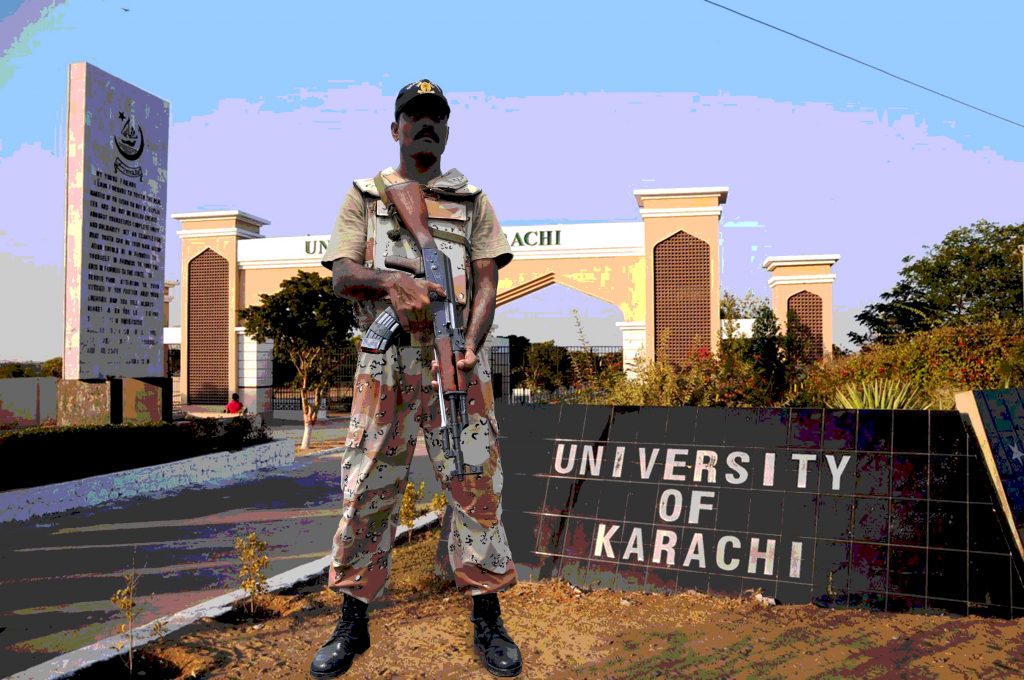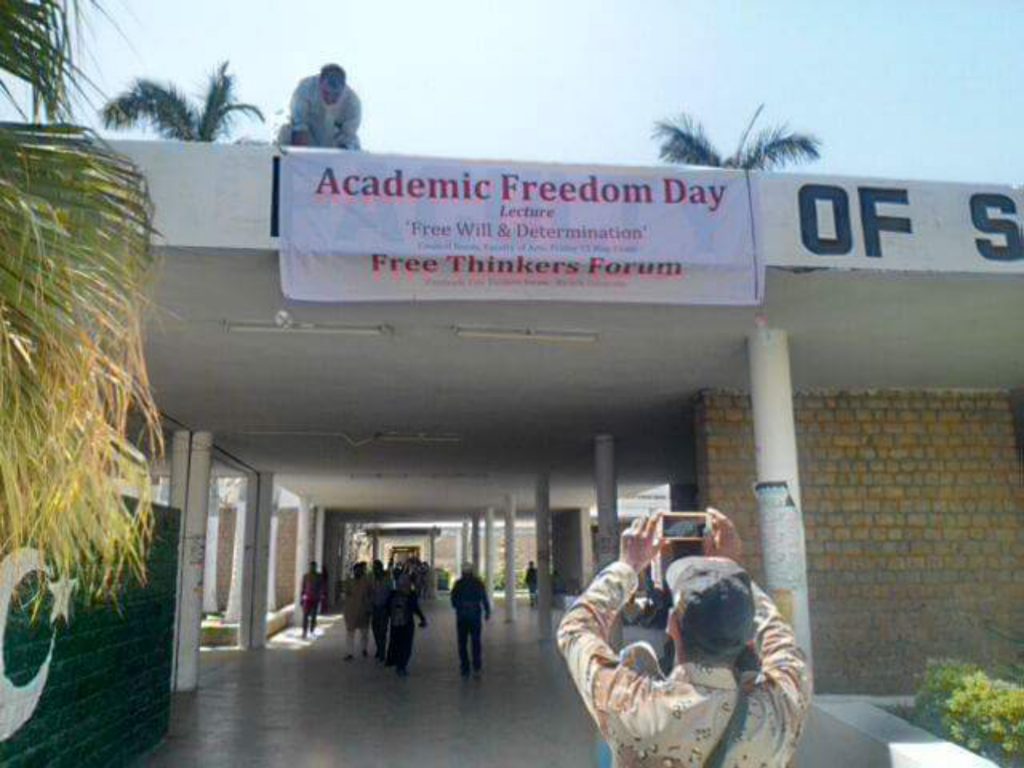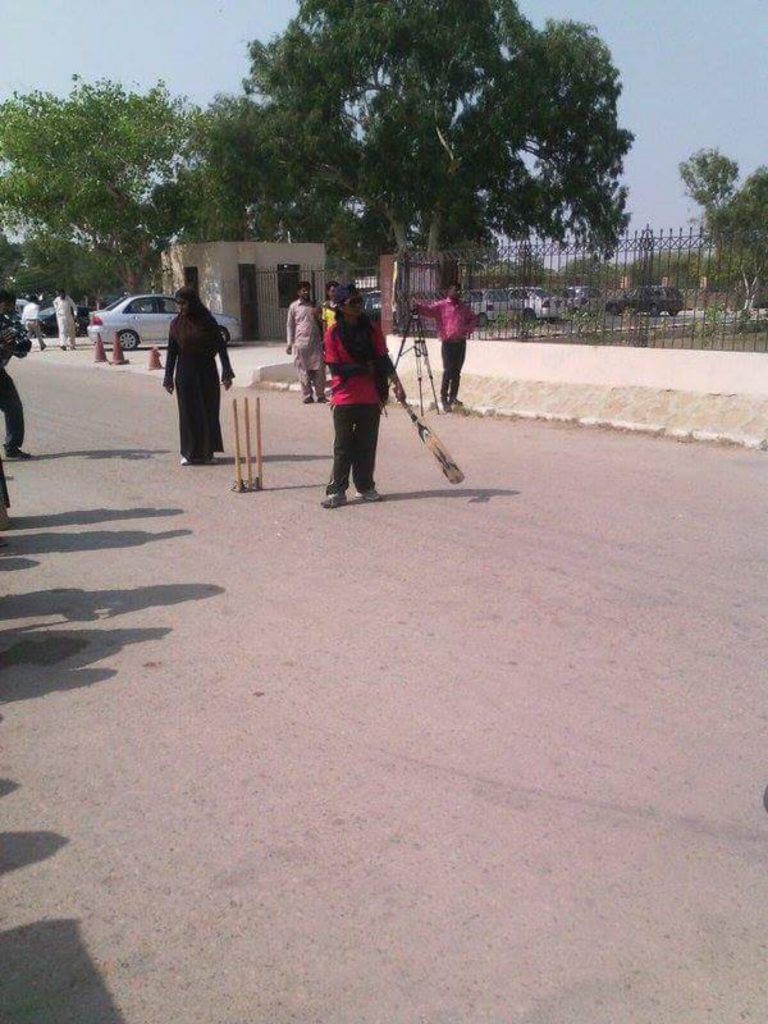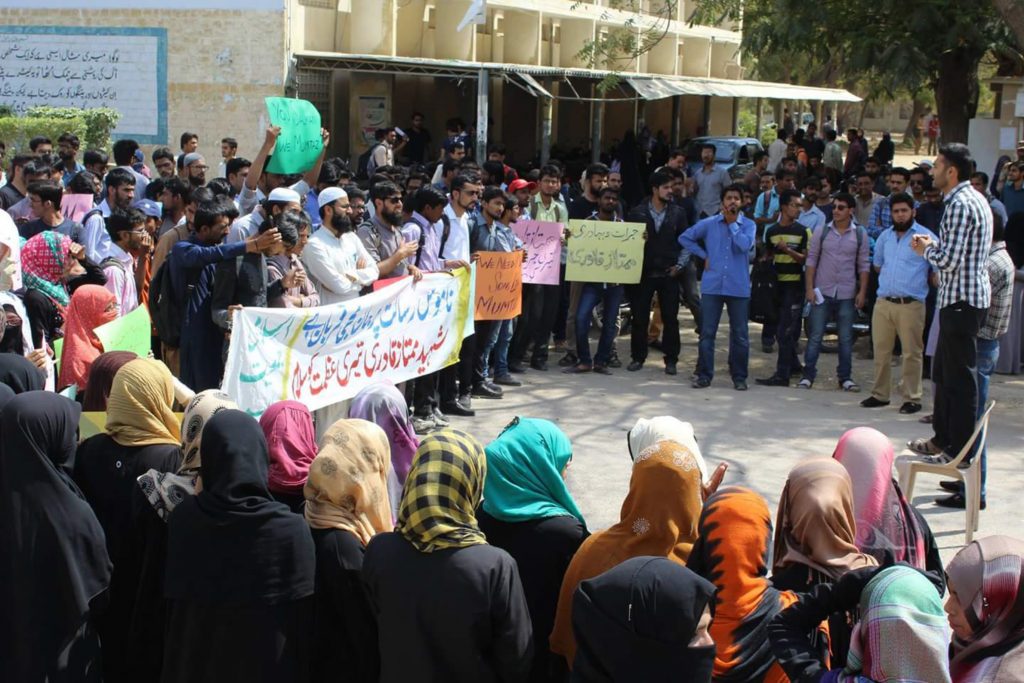Schools of Intolerance
By Hamza Baloch | Cover Story | Published 8 years ago

The University of Karachi University (KU) is an eminent institution, established in 1953. As an institution of higher education, it has nurtured eminent practitioners in the arts and sciences. Many senior journalists, intellectuals and academicians acknowledge it as their alma mater, and many progressive politicians developed their political leanings through its era of open debate.
The university itself was established after a long struggle by political activists of the progressive students’ organisation, Democratic Students Federation (DSF). Founded in 1951 at Dow Medical College, the DSF served as the pioneer of progressive politics and democratic struggle in the city.
However, much water has flowed under the bridge since. Successive military regimes have nurtured right wing religio-political elements, not just in mainstream politics, but in educational institutions as well. Curriculum and textbooks have been doctored, student unions banned and freedom of thought muzzled.
The Islami-Jamiat-e-Talaba (IJT), the student wing of Jamaat-e-Islami (JI), known for using violent tactics, has been around for decades. Previously, however, it faced strong opposition from left wing organisations such as the DSF and the National Students Federation (NSF). They had electoral supremacy over the IJT at the KU till the 1980s, when Zia completely banned the student unions, and patronised the IJT, owing to JI’s participation in the Afghan war. Zia’s brutal crackdowns destroyed anything to do with progressive political activism. The final blow came with the rise of ethnic politics and the emergence of the All-Pakistan Mohajir Students Organisation (APMSO) who, despite their opposition to the IJT, also ascribe to the same brand of violent student politics.
The rising culture of intolerance and resulting violence in university campuses in Pakistan today has often been linked with the post 9/11 political dynamics. However, that is not the case. Today’s intolerance is deeply rooted in Zia’s martial law of the 1980s and his destructive Islamisation policy. Zia patronised the IJT to suppress progressive elements on the campuses. The ensuing violence escalated as other student bodies followed the IJT lead and violence became a standard trait of student politics.
Today, Karachi University is one of the largest public sector institutions with more than 24,000 students currently enrolled and home to more than eight student organisations operating on campus. Most of them serve as student wings of the country’s mainstream political parties, religio-political groups and sectarian organisations.
Heated sectarian debates, followed by clashes, are a norm on the university campus. The mainstream right-wing IJT terms itself a Sunni ally of Egypt’s Muslim Brotherhood, Turkey’s Justice and Development Party and Saudi Arabia’s House of Saud, whereas the Imamia Students Organisation (ISO), representing Shia students, is allied with Iran’s Shia regime and Lebanon’s militant Shia organisation, Hezbollah.
Wall chalkings at the university include slogans such as “Death to America and India,” “Death to Jews and West,” “We are with Morsi and Erdogan,” and “Khomeni and Khamenei are our leaders.”

The IJT doesn’t stop there; it is known for curbing individual freedoms and forced gender segregation. In 2016, female students at KU were beaten up by the IJT, for playing cricket, with the IJT calling the sport un-Islamic and immoral. The very next day their rival, APMSO, announced a girls’ cricket match. Many students, not part of APMSO, also participated in that match, in a show of solidarity. Ironically, the Rangers, the paramilitary force which is deployed at KU to stop violence, sided with the IJT and gave protection to the Quran rally organised by the IJT the same day. They gathered outside the Administration block holding Qurans in their hands to protest against the girls playing cricket, pressurising the administration to cancel the match, which fortunately did not happen.
Prem Gali, (the street of love), was once a famous dating spot by the canteen, for KU students. These days, IJT students have taken on the role of moral policing there and should they find a couple sitting together, they subject them to extreme physical violence. In departments where the IJT has a strong hold, classrooms are divided by gender, and girls and boys are not allowed to sit together.
The APMSO and Peoples Student Federation (PSF), student wings of the so-called secular political parties, the MQM and PPP, bicker over placing banners and posters on the walls, organising carnivals and obtaining permits to set up stalls. They fail to prioritise students’ issues such as fee hikes and corruption on campus.
There are around 800 faculty members and teaching staff at the campus with diverse backgrounds, but some evangelical teachers are playing a troublesome role. For example, in the department of International Relations (IR), there are courses such as ‘Islamic diplomacy,’ and regular Dars-e-Quran, which have nothing to do with the subject.
A student recalls his experience of attending a lecture: “Once I attended a lecture where a senior faculty member of IR was praising the Afghan Taliban, calling them our brothers in faith. He referred to their safe release of Shahbaz Taseer last February. Ironically, the same teacher once celebrated the assassination of Salmaan Taseer, the slain Governor of Punjab, and hailed his killer Mumtaz Qadri as a hero.”

A female student recalls, “Once there was voting in my class for the female class representative (CR), and two candidates, Ayesha and Zainab, competed for the position. Zainab got more votes. The professor asked me if Zainab was a Shia or a Sunni and I said that had nothing to do with the criteria for the selection of CR. However, when I told him that Zainab was a Sunni, he took a deep breath and said, ‘Thank God.’”
This is the same teacher who once said in a class lecture, “If you keep on bombing innocent Muslims, and ally yourself with the armies of infidels, then surely the outcome will not be pleasant. He said this in reference to the December 2014 Army Public School (APS) attack, and justified the massacre of 144 students and others in front of a class of 60 students. No one uttered a single word in protest, we felt that he could harm us due to his links with radical Islamists.”
A female student activist adds, “When some of us decided to organise a vigil in memory of children killed in the APS attack, the Rangers showed up outside the Silver Jubilee gate of the campus, and told us that we needed a permit to hold the vigil, asking us to end it. A Baloch student tried to convince the Rangers, but he was humiliated and threatened and told that a ‘Baloch’s place is in a cave not at a university.’ We felt depressed and hopeless.”
Dr Moonis Ahmer, former dean of social sciences at KU, reminiscing about the past said, “Gender segregation and hijab are the order of the day, but back in the 1970s the environment of KU was moderate and open for debate and discussions without fear of violence.”
When concerned students informed the chairperson of the IR department about the subversive activities of some teachers, he advised them not to get involved in the issue and just focus on completing their four undergraduate years. He said that teachers were often appointed on a political basis and nothing could be done about it. It was a sensitive situation, he argued, and everyone wanted to stay out of trouble after the assassination of the Head of the Department of Islamic Studies, Professor Shakil Auj.
Students feel helpless when they inform the higher governing bodies of their respective departments about teachers who spread hate, sympathise with terrorists and promote sectarianism, and instead of taking action against such teachers, those in authority are seen breaking bread with them.
Some teachers of KU are under surveillance for alleged links with banned organisations such as IS. Professor Obaid Ahmed Khan, for one, was under investigation for his links with IS and there were rumours that he was recruiting for IS on campus. He was nominated in an FIR registered at Mobina Police Station in 2012 by the former dean of the department of Islamic Studies, slain professor Shakil Auj, for running a propaganda campaign against him and circulating text messages accusing him of blasphemy. He managed to get bail before arrest but another KU faculty member, Dr Abdul Rasheed, and NED University staffer, Samiuz Zamaan, were arrested, but later released on bail. These people were also investigated in the murder of Professor Auj.

In February 2016, Al Qaeda pamphlets were distributed by IJT students in the Arts Lobby of the university. This is the busiest area of the campus and the Rangers are deployed there, but they fail to deter recruiters for the jihadis.
While public sector universities are infested with political violence, private universities too are not free from the influence of radical Islamists. Tahir Taseer, a former graduate of Muhammad Ali Jinnah University (MAJU), said, “In the Business Administration programme there are some mandatory courses for all students, which are based on Islamic teachings, and even non-Muslim students have to take these courses. Most faculty members who teach these particular courses are affiliated with Darul Uloom Korangi, Karachi, and propagate the orthodox narrative of a particular Deobandi sect. There are instances when these teachers have, in front of the whole class, asked Hindu students to convert. They ask the students to pray for their Hindu friends to convert, and to observe Ramazan next year.”
A female student from the Jinnah University for Women (JUW) said, “Students of the Department of Media Studies are considered bad girls, because the conservative administration of the JUW is of the opinion that women should not work in the electronic media as newscasters and media persons. The department head, Inam Bari, allegedly idolises Abdul Aziz of the Lal Masjid. JUW is considering shutting down its media studies department because ‘good girls’ only study science and commerce, not social sciences.”
In 2016, security agencies arrested a SZABIST professor, Owais Raheel, an IBA graduate, who was a member of the banned Hizb ut Tehrir. His wife, a graduate of Bahria University, wrote a blog in his support on a popular online blog site, and called for the establishment of a caliphate on her Facebook account. Meanwhile, Adil Masood Butt, allegedly one of the main financiers of the Safoora Goth massacre, is the owner of the College of Accountancy and Management Sciences (CAMS) in Clifton, Karachi.
Saad Aziz, Sabeen Mehmud’s killer, was also involved in the Safoora Bus carnage, an attack on the Ismaili community. He was an IBA graduate and a member of IBA’s Islamist Iqra Society, which propagates hardliner Wahabi and Deobandi views.
A participant in one of the annual Islamic conferences arranged by the Iqra society recalled that one of the panelists, Saad Mehmood, a London- based astrophysicist, called every secular person an agent of the devil and a traitor to Islam, and an auditorium full of students at the IBA main campus applauded him for these remarks.
Another religious radical, Fahad Yunus, who taught at Tabani’s School of Accountancy (TSA), is known for organising sectarian debates known as Munaazra. He calls on Shia students to convert to Sunni Islam, since, according to him, Shias are worse than infidels.
Iqra University, which is ranked as number one by the Higher Education Commission (HEC), announced an event on their Facebook page in April in which they invited the controversial TV host, Amir Liaquat for a lecture. Luckily, after much outrage on the social media and opposition from students, the administration cancelled the event.
Owing to the environment of hate and physical violence, universities have turned into breeding grounds for radicals, and the space for debate and discussion has shrunk.
In 500 BC, there were public spaces in every neighbourhood across South Asia called Kotu Hala Shala, literally meaning “a place for raising curiosity.” Jain, Hindu and Buddhist teachers used to gather there to discuss ideas and knowledge and to hold public discourses. Perhaps what we need to do is to revive the centuries-old tradition of this land, to discuss different ideas openly and conduct scholarly debates with tolerance. Universities could then reflect the enlightened spirit of the Kotu Hala Shalas instead of becoming repositories of hate and ignorance. n


